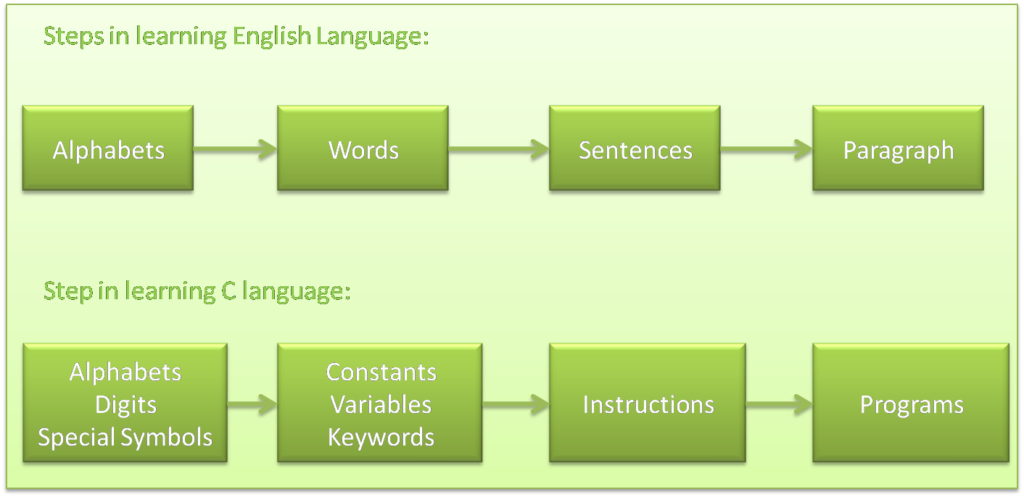Welcome to our C programming tutorial series!
Whether you’re a beginner eager to dive into the world of programming or an experienced developer looking to expand your skills, this series will provide you with a solid foundation in C. C is a powerful and widely-used programming language known for its efficiency, flexibility, and low-level control.
In this tutorial, we will start from the basics and gradually progress to more advanced concepts, allowing you to build a strong understanding of C programming.
By the end of this series, you’ll be equipped with the knowledge and skills to develop your own software, ranging from small utilities to large-scale applications.
So, let’s get started and embark on this exciting journey into the world of C programming!

1. C Programming Language Basics
- What is an algorithm?
- What is a flowchart?
- Introduction to C programming language
- Why should I learn the C language?
- How to learn the C language?
- The C Character Set
- Variable in c language
- Identifiers in c language
- constants in c language
- Keywords in C language
- Data type in C language
- Escape sequence in c
- Operators in C language
- Operator Operand Expression and Statement in c
- Operator hierarchy or precedence
- Libraries and Library function
- Compilation and Execution
- The First C Program
2. C Instructions
- c instructions and its types
- Type declaration instruction in c
- Arithmetic Instruction in c
- Control instructions in C
- Use of Logical Operators
- Use of Conditional Operator
- Loop Control Instruction
- Decision Control Instruction
- Case Control Instruction
- break and continue statement in c
3. C Functions
4. C Pointers
5. Data Types
- Different between Long and Short integers in C
- Different between Signed and Unsigned integers in C
- Different between Signed and Unsigned characters in C
- Different between Float and Doubles in C
- Dynamic memory allocation in c
- Storage classes in c
- Enumerated Data Type in C
- Typecasting in C Language
- Introduction to Union in C Programming Language
6. C Recursion
7. C Preprocessor
- What is C Preprocessor?
- What is C Preprocessor directives?
- Features of C Preprocessor
- How does C Preprocessor work?
- Types of C Preprocessor Directives
- Macro expansion in C Preprocessor
- Macros with Arguments in C Preprocessor
- Different between Macros and Functions
- File inclusion in C Preprocessor
- Conditional compilation in C Preprocessor
- Different between #if and #elif Directives
- The Build Process in C Language
8. C Array
- Understanding Arrays in C: A Beginner’s Guide
- Two Dimensional Array in C
- Multidimensional array in c
9. C Strings
- Understanding Strings in C: A Beginner’s Guide
- How pointers and strings works together in c?
- String built-in functions in C
- Two Dimensional Array of Characters in C
- Array of Pointers to Strings in C
- Limitation of Array of Pointers to Strings in C
10. C Structures
- Introduction to Structures in C: A Beginner’s Guide
- Array of Structures in C
- Features of Structures in C
- Uses of Structures in C
11. C Input/Output
- What is Input and Output in C
- Types of Input and Output in C
- Data Organization in C
- File Organization in C
- How to Count Characters in C
- How to Count Tabs in C
- How to Count Spaces in C
- File opening modes in C
- Record management in C
- Database management in C
12. Operations on Bits
- Bit Numbering and Conversion in C
- Bit Operations in C
- One’s Complement Operator in C
- Right Shift Operator in C
- Left Shift Operator in C
- Bitwise AND Operator in C
- Bitwise OR Operator in C
- Bitwise XOR Operator in C
- The showbits functions in C
- Bitwise Compounding Assignment Operator in C
If you are interested in going beyond this C Programming tutorial, then you can check out best C Programming Book named C PROGRAMMING LANGUAGE, 2ND EDN by Brian W. Kernighan / Dennis Ritchie (Author),